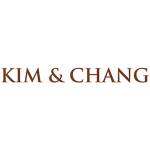1. How would you sum up the ethos of your law firm?
We have a steadfast commitment to the success of our clients, and we believe it is best achieved by investing in top talent and operating teams that seamlessly collaborate across different disciplines. We are committed to providing the highest quality representation and legal advice to every client based on a deep understanding of our clients' needs and objectives and our dedication to client service. We are also mindful that the privilege of being the premier law firm in Korea comes with the responsibility to make significant contributions to our society and to work for the benefit of those in need through pro bono efforts. We were very happy and honored when Kim & Chang was named "Pro Bono Law Firm of the Year" at Who's Who Legal Awards 2017.
2. What edge does your legal team have over others in the market?
Kim & Chang has long been known for a unique, team-based approach which has enabled us to successfully represent and advise our clients in connection with their most significant and complex matters. We work together on a task-force basis on all our matters, operating teams of professionals that are the best in their respective fields in a flexible manner. Based on the extensive experience and expertise of our professionals—in both legal and non-legal areas and across different jurisdictions—we have been able to come up with optimal solutions for our clients when they turn to us for counsel in connection with their most critical matters. This approach also enables us to serve as a trusted one-stop firm for all legal and business needs of our clients.
3. What do you personally enjoy most about practising law?
What makes me especially excited about the practice of law is the sense of accomplishment I get after coming up with the most suitable solution for a critical legal issue faced by a client, based on my legal knowledge and lawyering skills that I have honed over the years. Also, there never seems to be a dull moment in the practice of law with constant changes taking place in laws and regulations, business, economy, technology and geopolitical landscape, to name a few.
4. How have the demands placed on law firms changed in Korea over recent years?
As with any other law firms around the world, Korean law firms have had to evolve with new challenges brought on by major shifts in economy and technology (say, cryptocurrency and blockchain technology). In the past several years, many foreign law firms set up presences in Korea following the opening of the Korean legal services market and we have been working to find a way to ensure that our clients have access to the most appropriate type of legal service for their needs.
5. How do you keep up to date with trends in international practice?
I closely monitor major foreign newspapers, periodicals and legal trade publications as well as newsletters and publications issued by other major global law firms. But what I find even more useful in terms of keeping myself up to date with trends in international practice is my frequent meetings with foreign clients and global law firms that we closely collaborate with, and also attending conferences such as the IBA conference. I think the two-way communication available at theses meetings and conferences, which allows you to discuss and ask questions about various issues, makes a big difference.
6. What have been the most interesting recent changes in Korea from a foreign investor's perspective?
There are a few things worth noting in this respect.
First of all, following the adoption of the stewardship code by the Korea National Pension Service (NPS) and other institutional investors, there has been a rise in shareholder activism in Korea, which is in line with the global trend. We believe that shareholder activism is here to stay and that it will likely bring about corporate governance reforms and increases in shareholder value.
On the geopolitical risk front, although there still remains uncertainty regarding North Korea, it would be fair to say that there is decreased tension overall in the wake of the Inter-Korean Summits, the U.S.-North Korea Summits and North Korea's commitment for denuclearization.
7. How optimistic are you about the future of the Korean market and why?
Currently, we are witnessing a lot of political and economic uncertainties both in Korea and overseas, such as the trade war between the U.S. and China, Korea's trade tensions with Japan, Brexit, uncertainty regarding North Korea relations and China's slowing economic growth.
Under the current business environment, companies are likely to take a more cautious approach toward investment, which could mean more challenges for those doing business in Korea, including the Korean legal market. However, even during periods when business and investment activities are tempered, there is a demand for quality legal services in the various different disciplines of legal practice. I remain relatively optimistic about the future of the Korean legal market because I strongly believe that the legal profession will be able to adjust to the increased sophistication of clients and their business needs and law firms that can make that transition will continue to be in demand.

